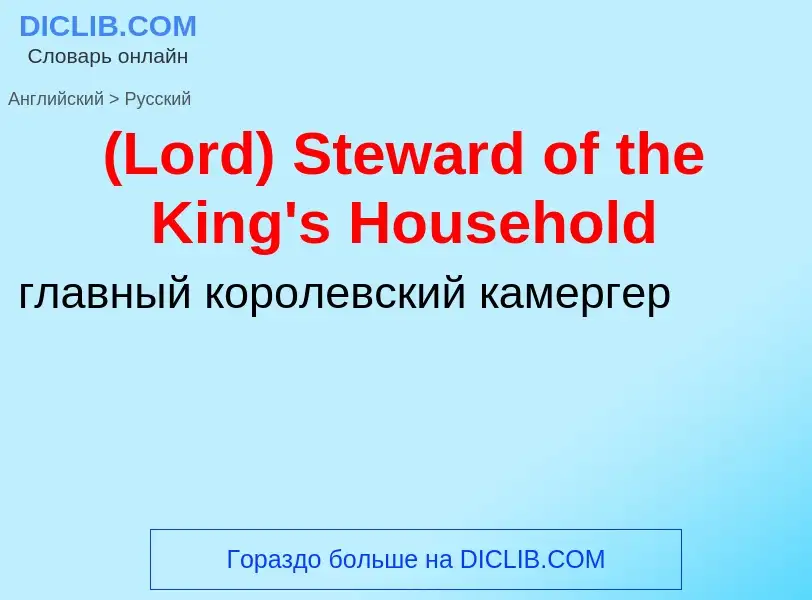Vertaling en analyse van woorden door kunstmatige intelligentie
Op deze pagina kunt u een gedetailleerde analyse krijgen van een woord of zin, geproduceerd met behulp van de beste kunstmatige intelligentietechnologie tot nu toe:
- hoe het woord wordt gebruikt
- gebruiksfrequentie
- het wordt vaker gebruikt in mondelinge of schriftelijke toespraken
- opties voor woordvertaling
- Gebruiksvoorbeelden (meerdere zinnen met vertaling)
- etymologie
(Lord) Steward of the King's Household - vertaling naar russisch
[,lɔ:d'tʃeɪmbəlɪn]
общая лексика
лорд-гофмейстер (высшая придворная должность; ведает хозяйством королевского двора; до 1968 выдавал разрешение на постановку пьес)
лорд-гофмейстер (ведает хозяйством королевского двора)
полное выражение
Lord Chamberlain of the Household
Definitie
Wikipedia
.jpg?width=120)
The Lord Steward or Lord Steward of the Household is an official of the Royal Household in England. He is always a peer. Until 1924, he was always a member of the Government. Until 1782, the office was one of considerable political importance and carried Cabinet rank.
The Lord Steward receives his appointment from the Sovereign in person and bears a white staff as the emblem and warrant of his authority. He is the first dignitary of the court. In the House of Lords Precedence Act 1539, an Act of Parliament for placing of the lords, he is described as the grand master or lord steward of the king's most honourable household. He presided at the Board of Green Cloth, until the Board of Green Cloth disappeared in the reform of local government licensing in 2004, brought about by the Licensing Act 2003 (section 195). In his department are the Treasurer of the Household and Comptroller of the Household, who rank next to him. These officials were usually peers or the sons of peers and Privy Councillors. They also sat at the Board of Green Cloth, carry white staves, and belong to the ministry. The offices are now held by Government whips in the House of Commons. The duties which in theory belong to the Lord Steward, Treasurer and Comptroller of the Household are in practice performed by the Master of the Household, who is a permanent officer and resides in the palace. However, by the Coroners Act 1988, the Lord Steward was still appointed the Coroner of the Queen's Household, until the office was abolished in 2013 by the Coroners and Justice Act 2009.
The Master of the Household is a white-staff officer and was a member of the Board of Green Cloth but not of the ministry, and among other things he presided at the daily dinners of the suite in waiting on the sovereign. He is not named in the Black Book of Edward IV or in the Statutes of Henry VIII and is entered as master of the household and clerk of the green cloth in the Household Book of Queen Elizabeth. But he has superseded the lord steward of the household, as the lord steward of the household at one time superseded the Lord High Steward of England.
In the Lord Steward's department were the officials of the Board of Green Cloth, the Coroner ("coroner of the verge"), and Paymaster of the Household, and the officers of the Royal Almonry. Other offices in the department were those of the Cofferer of the Household, the Treasurer of the Chamber, and the Paymaster of Pensions, but these, with six clerks of the Board of Green Cloth, were abolished in 1782.
The Lord Steward had formerly three courts besides the Board of Green Cloth under him—the Lord Steward's Court, superseded in 1541 by the Marshalsea Court, and the Palace Court.
The Lord Steward or his deputies formerly administered the oaths to the members of the House of Commons. In certain cases (messages from the sovereign under the sign-manual) the lords with white staves are the proper persons to bear communications between the Sovereign and the Houses of Parliament.

.jpg?width=200)
![Sir Robert Walpole]], the Prime Minister who gave the Lord Chamberlain official censorship duties. Painting by [[Arthur Pond]]. Sir Robert Walpole]], the Prime Minister who gave the Lord Chamberlain official censorship duties. Painting by [[Arthur Pond]].](https://commons.wikimedia.org/wiki/Special:FilePath/Robert Walpole, 1st Earl of Orford by Arthur Pond.jpg?width=200)
